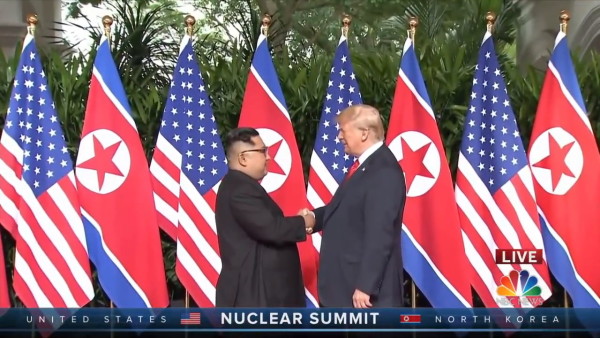

Your humble Pentagon correspondent is taking a break from covering Marines who have run afoul of the Corps’ social media policy in order to write about something that has nothing to do with rap artist R. Kelly: World peace.
Now in his third year in office, it is clear that President Donald Trump thinks he can will the world to finally be at peace. But when it comes to his grand proclamations of victory versus actual conditions on the ground, the president’s reach often exceeds his grasp.
On Feb. 28, Trump told service members at Joint Base Elmendorf-Richardson that ISIS in Syria had lost all “100%” of its former territory in Syria – two years faster than one general told him it would take. Had the victory that he wanted so badly for so long finally come to pass?
Well, no. Hours before the president spoke, the head of the Syrian Democratic Forces told Reuters that it would take another week to capture ISIS’ last stronghold in Syria.
As so often happens in the Pentagon when the president speaks, defense officials scurried to figure out what Trump meant and referred reporters’ questions to the White House.
It is just the latest example of the president declaring that ISIS has either been defeated or is on the verge of the defeat. In December, he vowed to bring all U.S. troops from Syria home, prompting then-Defense Secretary James Mattis to resign. Now he seems comfortable with leaving several hundred troops in the country – until he changes his mind again.
Meanwhile, Trump is so desperate to leave Afghanistan that a U.S. peace envoy is negotiating with the Taliban – without including the Afghan government. (British Prime Minister Neville Chamberlain took the same approach when negotiating with Hitler about Czechoslovakia. Afterward, he announced he had secured, “peace for our time.”)
The New York Times reported on Feb, 28 that the U.S. government’s latest peace plan calls for withdrawing all foreign troops from Afghanistan over five years. The plan is reminiscent of U.S. demands in an earlier war for a “decent interval” between the withdrawal of U.S. troops from South Vietnam and the communists’ final victory. (That turned out to be two years and one month.)
Trump has made clear that he feels the post Sept. 11 wars have been a waste of money that have accomplished nothing. He would much rather invest in F-35 fighters and other high tech weapons in the hopes that such military might will ensure Russia and China would never attack the United States – peace through strength.
However, the president has a more laudable motive to end the Forever Wars: It is painful for him to console the grief-stricken families of the fallen.
“I get very saddened when I have to write letters or call parents or wives or husbands of soldiers who have been killed fighting for our country,” Trump said in a Dec. 19 video in which he announced his initial Syria withdrawal. “It’s a great honor; we cherish them; but it’s heartbreaking.”
On this point, the president has the moral high ground, especially compared to retired Army Gen. Stanley McChrystal, whose best advice for the way forward in Afghanistan was “to keep a limited number of forces there and just kind of muddle along and see what we can do.”
One region where Trump does not seem to be willing to pay any price for peace is the Korean peninsula. The president surprised many by walking away from an offer by North Korean dictator Kim Jong Un to dismantle a nuclear complex in return for ending sanctions.
It had appeared as though Trump wanted to score a foreign policy win by signing an agreement with Kim – no matter how imperfect it was. Yet unlike in Syria and Afghanistan, the president wasn’t willing to abandon his allies for a face-saving compromise.
“I could’ve signed an agreement today, and then you people would’ve said: ‘Oh, what a terrible deal. What a terrible thing he did,'” Trump told reporters in Hanoi on Thursday. “And, you know, there was a potential we could’ve signed something today. I could’ve 100 percent signed something today. We actually had papers ready to be signed, but it just wasn’t appropriate. I want to do it right. I’d much rather do it right than do it fast.”
Still, the Defense Department announced late on March 2 that it will replace major wargames in South Korea that had been scheduled for this month with “newly designed command post exercises and revised field training programs.”
It is too early to draw any lessons about how the failure of his summit with Kim will affect Trump’s hopes for world peace. But it appears that one lesson the president has yet to learn is that hope is not a plan.
Make sure you are subscribed to the Pentagon Run-Down for all the latest news.
SEE ALSO: Otto Warmbier’s parents blast North Korean leader over son’s death after Trump accepts excuse ‘he didn’t know about it’
WATCH NEXT: South Korea Conducts Precision Strike Drill
Jeff Schogol covers the Pentagon for Task & Purpose. He has covered the military for 13 years and embedded with U.S. troops in Iraq and Haiti. Prior to joining T&P, he covered the Marine Corps and Air Force at Military Times. Comments or thoughts to share? Send them to Jeff Schogol via email at schogol@taskandpurpose.com or direct message @JeffSchogol on Twitter.
